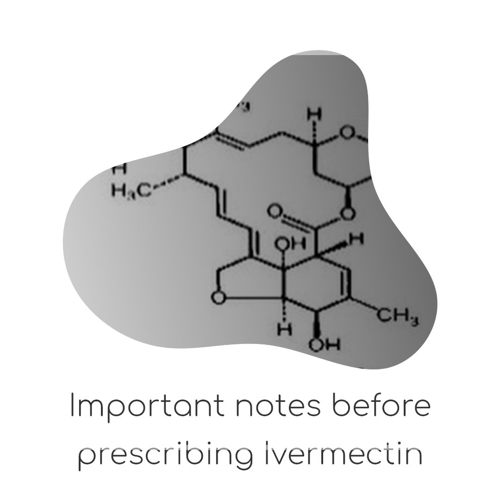Approach towards Ivermectin application in COVID-19 patients

Source: IVERMECTIN MD TEAM (Sándor Tóth) / resources at bottom of article
Dear Colleagues,
I have performed a deep search for bringing to you some basic facts which might shape your Approach towards Ivermectin application in CoViD-19 patients. Unfortunately, majority of the studies I found were done on animals (not surprising as Ivermectin is widely used in veterinary medicine). I will not quote here precise numbers, since those were largely dependent on doses, animal species and measurement methods. Approximate values for human subjects, however, are mentioned when needed.
Rather, I will give you here the essence of what I have concluded from these studies.
- Ivermectin is a safe drug with few and mild adverse reactions in human subjects.
You should consider only a., d., e. and f. as true adverse reactions. These include:
a. allergic reactions (Breathing difficulties, swelling of throat or tongue, skin rash, Stevens-Johnson syndrome). Allergic reactions to Ivermectin are extremely rare.
b. CNS symptoms (dizziness, weakness, confusion, drowsiness, movement coordination disturbances, nausea, vomiting, seizures, syncope, coma). In all cases with CNS adverse reactions, the blood-brain barrier (BBB) was proven to be damaged or ineffective (a rare genetic condition of inborn BBB inadequacy).
c. Eye symptoms (pain, swelling, redness, bleeding, loss of vision). These symptoms, however, appear only in patients treated for onchocercariasis, and are related to toxic reactions to substances released from the dying parasites,
d. Gastrointestinal reactions (loss of appetite, intestinal unrest, diarrhea, abdominal pain)
e. Skin reaction (itching, mild rash, redness)
f. Other symptoms (neck and back pain, swelling and tenderness of lymph nodes). - Considering the above point b., Ivermectin should not be given to patients with possible blood-brain barrier damages (meningitis, encephalitis, cerebellitis, brain tumors either benign or malignant, stroke).
With history of cranial operation or long-ago stroke, ideally an isotope-assisted CT or MRI scan should be performed for testing the BBB integrity. - Although Ivermectin was not associated with any teratogenic effect when it was inadvertently given to pregnant women, its safety in pregnancy is not clearly determined. It passes into the mother milk, so it should be avoided for breast-feeding women, too. Its safety is not determined for children under 15 kg (30 lbs). I would suggest to avoid it, taking into consideration that according to neuroanatomy research data blood-brain barrier is still in developing phase in infants and children under 2 years.
- Ivermectin is a lipid-soluble substance. This fact raises the need for a few considerations:
a. It should not be taken with water if liquid form is used. After taking the pill or the liquid form, it could be washed down with water in a few seconds.
b. Best bioavailability is reached when it is taken immediately after a fat-rich meal.
c. Highest serum values can be reached if the active substance is dissolved in a 40 v/v% ethanol.
d. In the circulation Ivermectin, and its biologically active metabolites (3”-O-desmethyl-H2B1a, and 22,23-dihydroavermectin B1a) are present mostly in albumin-bound state (93%).
e. Ivermectin is processed in the liver by cytochrome P-4503A4, released in the bile, and partially reabsorbed by the intestinal mucosa, so after taking a single dose, a peak concentration at 4-5 hours is followed by a second and third peak at 6 and 12 hours.
f. Ivermectin has a disproportionate serum/tissue distribution. Highest concentration is present in subcutaneous fat (about 10-fold of the serum concentration), followed by the liver (5-6-fold), the kidney (3X) and the muscles (2,1x). Peak tissue concentration appears at 8 hours after ingestion of the drug. Clearance from the tissues is also much slower. Serum half-life is reported between 11 to 18 hours. Fat tissue half-life is between 7-10 days. 48 hours serum level (1/4 of the peak concentration) value is still measurable in the fat tissues after 21-28 days. - Considering the pharmacokinetic data above, malnourished patients should be given higher total doses (preferably in more increments, not an elevated single dose) to reach the required therapeutic effect.
- Preventive doses might be used in 2 weeks increments (or even less frequently for people in only moderate danger of getting infected).
- People with liver issues should be given smaller individual doses in a longer time-frame for the required cumulative dose.
I can’t quote here all sources, yet I provide a few examples. I used search strings of “Ivermectin serum tissue distribution”, “Ivermectin half life” “Ivermectin metabolism”, Ivermectin side effects” and “blood-brain barrier”. I would appreciate very much if you could add your own search data, personal observations and suggestions to this topic.
- https://pubmed.ncbi.nlm.nih.gov/8839664/
- https://malariajournal.biomedcentral.com/track/pdf/10.1186%2Fs12936-017-1801-4
- https://www.ema.europa.eu/en/documents/mrl-report/ivermectin-modification-maximum-residue-limits-summary-report-5-committee-veterinary-medicinal_en.pdf
Source: IVERMECTIN MD TEAM
Notes from the comments section:
- So if you are taking the liquid form / injectable solution of Ivermectin, take it after a high-fat meal.
- It should be taken ‘alone’ after a fatty meal and you can wash it down with water, but not premix with water because the active substance will precipitate in water.
- Prophylaxis = 12-16mg every 2 weeks, calculated by body weight (0.2mg/kg)
- Injectables (10mg/ml) are prepared in 1% concentrations. Therefore, you should calculate 0.1 ml for every 5 kg body weight. This equals to 5 drops if your preparation is provided with a dropper. In other terms one drop for every kg of body weight.
- Q.) Why shouldn’t patients with benign brain tumors take Ivermectin?
A.) Because tumors destroy the blood-brain barrier around and within theis spread. Ivermectin causes very serious side-effects if it passes into the brain.
Q.) So this is the case for benign meningeomas to?
A.) Unfortunately, yes. Benign tumors grow locally and do not produce metastases. Growth of the mass, however, destroys cells around (and tumor cells also die within the mass irself. Decomposig cells release a number of intracellular enzymes, which are signals for inflammation and proteases. Proteases “clean up” the cell debris and induce processes which “enhance the permeability of blood vessels (providing more “raw material” and energy for “reconstruction” of decaying tissues. This way, the tumors (even benign ones) cause leaks in the blood-brain barrier. - Q.) What kind of side-effects could Ivermectin cause if it passes into the brain?
A.) From dizziness to confusion to coma.
Q.) Reversible or hard to say?
A.) Reversible in most cases. In 40+ years and 4.5 billion doses only 2 deaths were attributed to Ivermectin itself. - Q.) I read you shouldn’t take IV if on meds that cross the blood brain barrier- wouldn’t seizure med (Keppra) cross BBB?
A.) The IVM should not cross the BBB. If the other drug does, but does not carry along the IVM, then there is no issue. - Q.) Can it ( Ivermectin ) be given to patients who had a mild stroke a year ago?
A.) Stroke can be occlusive stroke (a major or medium blood vessel in the brain is occluded) or rupture. If it was an occlusive one, It is probably regenerated in a year. If it was a rupture stroke, IVM should not be given. Best is to test the blood-brain barrier integrity via contrast-enhanced brain MRI before giving IVM. - Q.) 50 yr old cerebral palsy (athetotic) lady would like to take it but not because of bbb right?
A.) Unfortunately, I can’t recommend it. - Dizziness (as a side-effect) indicates a certain degree of blood-brain barrier permeability.
Also check Drugs.com for any known interactions with your specific medication
Update 5th June, 2021: Dr Mobeen Syed has just uploaded a video containing many questions people had about Ivermectin specific to certain underlying conditions. I think this post is a useful post for that discussion.
- 0:00 Introduction
- 1:00 What if a person had Meningitis in the past?
- 2:05 What if I have migraine headaches?
- 2:23 What about a patient of encephalitis?
- 3:09 What if a patient has tinnitus and hyperacusis?
- 4:00 Can Alzheimer’s patient take Ivermectin?
- 4:10 What about a patient who had a stroke?
- 4:36 Can a patient with renal failure take Ivermectin?
- 5:30 Patient on blood thinners, can they take Ivermectin?
- 5:50 Will Ivermectin create antibodies against SARS-COV-2?
- 6:36 How long can I take Ivermectin?
- 7:42 Why are there so many protocols for Ivermectin?
- 9:29 Should I take Ivermectin on empty stomach or with food?
- 10:39 Do I need to administer my patients with Doxycycline or Azithromycin in addition to Ivermectin?
- 10:56 Should the prophylactic dose be given monthly?
- 11:25
Can Neem be use instead of Ivermectin?(says he didn’t research this one) - 12:14 Can pregnant women and children apply Ivermectin topically?
- 12:40 Is it a Prescription drug?
- 13:15 Should lang haulers take Ivermectin?
- 14:12 Where do I get Ivermectin?
- 14:28 Can someone on meds for hypertension, diabetes and renal stones take Ivermectin?
- 14:40 Can kids take Ivermectin?
- 15:46 Can a patient of post COVID long haul syndrome (PCLHS) with gastrointestinal symptoms take ivermectin?
- 16:12 How to calculate Ivermectin dose for a prophylaxis for a 250 lbs person?
- 17:03 Can patients of multiple sclerosis (MS) take Ivermectin?
- 17:42 I have a brain shunt, can I take Ivermectin?
- 18:21 Does Ivermectin replace hydroxychloroquine and zinc for the COVID prophylaxis?
- 18:49 Can patients with chronic constipation, gas and bloating take Ivermectin?
- 19:28 Can I take lesser than a therapeutic dose for the Ivermectin prophylaxis?
- 20:07 Does one full dose of Ivermectin mean one tablet/pill or many tablets/pills?
- 20:58 My weight is for 12 mg of Ivermectin, however we have 15 mg tablets. Can I take 15 mg instead of 12 mg?
- 21:16 How do I round up the dose of Ivermectin?
- 21:45 Can one take Ivermectin after vaccination?
And he has another Ivermectin video for dosages.

Site Notifications/Chat:
- Telegram Post Updates @JourneyToABetterLife (channel)
- Telegram Chatroom @JourneyBetterLifeCHAT (say hi / share info)
- Gettr Post Updates @chesaus (like fakebook)
Videos:





